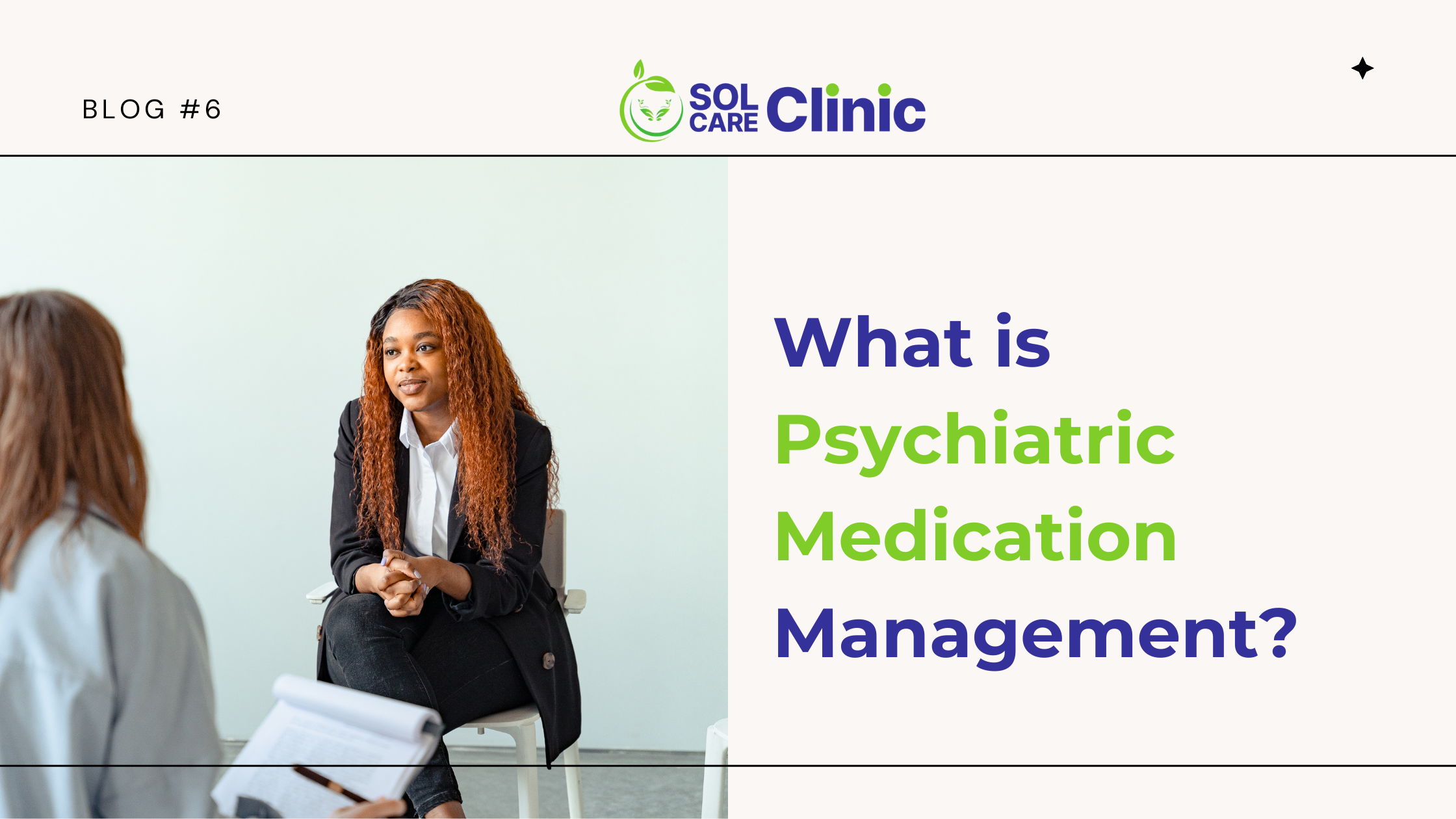Key Takeaways
→ Psychiatric medication management is a crucial component in treating mental health disorders. The proper management and supervision of psychiatric medications can significantly improve the lives of millions.
→ However, the landscape of psychiatric medication can be complex and daunting for both patients and healthcare providers. This blog will explore the significance, challenges, and essential principles guiding psychiatric medication management.
What is Medication Management in Psychiatry?
Psychiatric medications encompass a broad array of drugs made to alleviate symptoms associated with various mental health conditions. These conditions can include mood disorders like bipolar disorder, as well as anxiety disorders, psychotic disorders, and more. The drugs used in psychiatric medication management target specific neurotransmitters or neural pathways involved in these disorders to restore balance and alleviate symptoms.
The categories of psychiatric medications are extensive, each with its unique mechanisms of action and therapeutic profiles. Commonly prescribed categories include antidepressants, mood stabilizers, antipsychotics, anxiolytics, and stimulants. Examples within these classes include Selective Serotonin Reuptake Inhibitors (SSRIs), Serotonin-Norepinephrine Reuptake Inhibitors (SNRIs), benzodiazepines, and atypical antipsychotics. Each of these medications is tailored to address specific symptoms and conditions.
The Significance of Medication Management in Psychiatry
Psychiatric medical management is a specialized aspect of psychiatric mental care involving the evaluation, monitoring, prescription, and adjustment of psychiatric medications used to treat mental health disorders. It is typically overseen by psychiatrists, psychiatric nurse practitioners, or other qualified mental health professionals. The clinician educates and supports the individual and their family members throughout the medication management process. It may include information about the medication, potential side effects, coping strategies, and lifestyle modifications to support overall mental health and well-being. Effective psychiatric medication management is essential for several reasons:
- Symptom Relief: Psychiatric medications can alleviate distressing symptoms, providing relief to individuals with mental health disorders. They can lift the veil of depression or stabilize mood swings in bipolar disorder, playing a vital role in symptom management.
- Enhanced Functioning: Psychiatric medications help individuals function better by alleviating symptoms, improving mood, reducing anxiety, and strengthening cognitive clarity. This, in turn, can lead to better performance at work, school, and in interpersonal relationships.
- Preventing Relapse: For many mental health conditions, medication is essential for preventing relapse. Consistent adherence to prescribed regimens can help maintain stability and reduce the likelihood of acute episodes. Coordination among healthcare providers, such as psychiatrists, primary care physicians, therapists, and pharmacists, ensures smooth care transitions and comprehensive management of individuals’ mental health needs.
- Multimodal Treatment: Psychiatric medication management often complements other therapeutic modalities, such as psychotherapy, counseling, and lifestyle interventions. These approaches are integrated into a comprehensive treatment plan tailored to the individual’s needs.
What are the Challenges in Psychiatric Medication Management?
Despite its significance, psychiatric medication management is not without its challenges:
- Side Effects: Many psychiatric medications can cause many possible side effects, ranging from mild discomfort to severe adverse reactions. Its side effects include nausea, weight gain, sexual dysfunction, and metabolic disturbances, which can impact treatment adherence and quality of life.
- Individual Variability: Response to psychiatric medications varies greatly among individuals. Finding the correct medication, dosage, and formulation requires a trial-and-error approach, which can prolong symptom relief and increase frustration for patients and clinicians.
- Polypharmacy: Managing multiple psychiatric medications at the same time, known as polypharmacy, presents challenges in terms of drug interactions, cumulative side effects, and adherence. Simplifying regimens while maintaining effectiveness is a delicate balancing act.
- Stigma: Stigma surrounding mental illness and psychiatric medication can discourage individuals from seeking treatment or adhering to prescribed regimens. Education and destigmatization efforts are crucial in promoting acceptance and understanding.
What are the Principles of Psychiatric Medication Management?
Several fundamental principles guide effective psychiatric medication management:
- Comprehensive Assessment: A thorough psychiatric evaluation, including a detailed history, diagnostic assessment, and consideration of comorbidities, informs the selection of appropriate medications. Response to psychiatric medications varies greatly among individuals. Finding the correct medication, dosage, and formulation requires a trial-and-error approach, which can prolong symptom relief and increase frustration for patients and clinicians.
- Shared Decision-Making: Collaborative decision-making between patients and healthcare providers empowers individuals to actively participate in their treatment planning actively, fostering ownership and adherence.
- Monitoring and Follow-Up: Regular monitoring of symptoms, medication adherence, and side effects is essential for optimizing treatment outcomes and addressing emerging concerns promptly.
- Individualized Treatment: After a medication is prescribed, monitoring its effectiveness and safety is crucial. This requires regular appointments with the clinician to assess the individual’s response to the medication, monitor for adverse reactions, and make any necessary adjustments to the dosage or type of drugs.
- Mental Psychoeducation: Comprehensively educating patients and their families about their condition, treatment options, and expectations fosters informed decision-making and promotes treatment adherence. Psychiatric medication management aims to help individuals with mental health disorders find the most effective and tolerable medication regimen to manage their symptoms and improve their quality of life. It is often integrated with other forms of treatment, such as therapy and psychosocial interventions, to provide comprehensive care.
- Continuity of Care: Coordination between healthcare providers, including psychiatrists, primary care physicians, therapists, and pharmacists, ensures seamless care transitions and comprehensive management of the individual’s mental health needs.
The Bottom Line
Psychiatric medication management is a dynamic and multifaceted aspect of mental healthcare, integral to the treatment of various mental health disorders. While navigating the complexities of psychiatric medications can be challenging, adherence to fundamental principles, collaboration between patients and providers, and a holistic approach to treatment can optimize outcomes and enhance the well-being of individuals living with mental illness. By fostering understanding, destigmatizing treatment, and prioritizing patient-centered care, we can navigate the maze of psychiatric medication management with compassion and efficacy.





